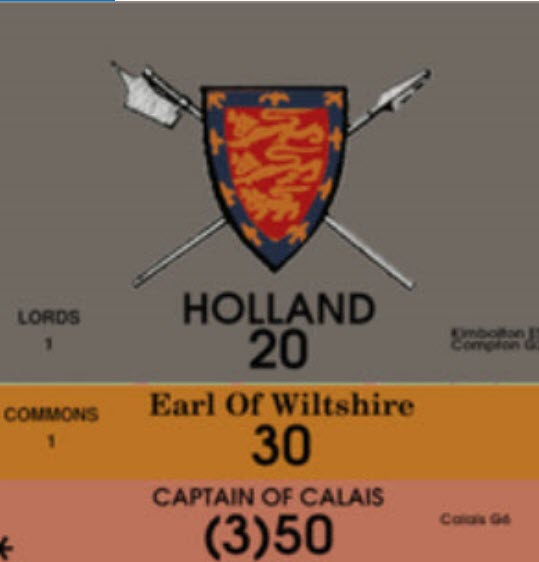Yup, as I told you earlier, we are using the Deluxe edition of the map. Which also conveniently gives the Towns and Castles far more distinctive (and decipherable) color coding than the solid red used for those. Locations. Telling an Open and Closed town apart was almost impossible on those. 1976 was cool for a lotta reasons, but Graphics wasn’t one. it also integrates all the expansion cards into the game (some locations on expansion cards weren’t on the original map- Dublin, f’rinstance and Castles Granted by Offices).
1450?
At least someone is reading them.
I appreciate them!
Faction Leader Profile
@Ironsight The Earl of Westmoreland’s Faction (Portcullis)
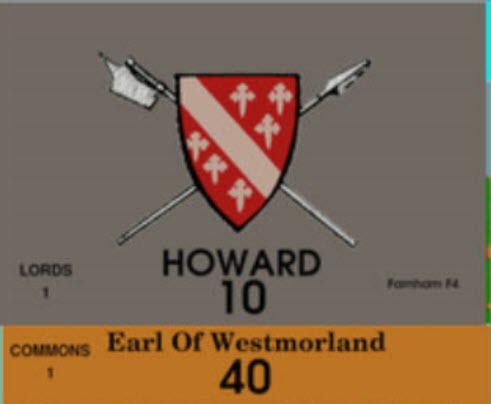
John Howard, 1st Baron Howard, 1st Earl of Westmoreland
John Howard was born in 1425, the son of Sir Robert Howard of Tendring and Margaret de Mowbray, eldest daughter of Thomas de Mowbray, 1st Duke of Norfolk. His paternal grandparents were Sir John Howard of Wiggenhall, and Alice Tendring, daughter of Sir William Tendring. The Howards were minor landowners and held county offices in Norfolk and Suffolk in the preceding century. The are Gentry who married well and used local prominence to gain connections to the more pedigreed noble houses in the realm. Thus, many of the great noble families see them as upstarts, no more than jumped-up peasants.
In his youth John Howard was in the household of his cousin John Mowbray, Duke of Norfolk and was drawn into Norfolk’s conflicts with William de la Pole, Duke of Suffolk. In 1453 he was involved in a lawsuit with Suffolk’s wife, Alice Chaucer. He had been elected to Parliament in 1449 and has held several local offices. He was at one point during this period described as “wode as a wilde bullok”. He is said to have been with Lord Lisle in his expedition to Guyenne in 1452, which ended in defeat at Castillon in 1453.
For his loyal service to the Realm during the period of Richard of York’s Regency Protectorate during the King’s Incapacity, he was awarded with the title of First Earl of Westmoreland (Second Creation) this last year. This title had been vacated from a branch of the Neville family that favored the Lancastrians upon the death of Sir Ralph Neville, First Earl of Westmoreland (First Creation), leaving the title in dispute. Howard’s cousin, the current Duke of Norfolk, had lobbied hard for this title to be awarded to Howard and in doing so had strengthened the power of Yorkist networks in the North at the expense of the Lancastrians (namely the Beauforts and to some extent the Percys). Howard was also named Steward of the Royal Household by the Protectorate Council, much to Margaret of Anjou’s chagrin. Howard also has a personal hold over John Stafford, The Archbishop of Canterbury, due to a large loan he made to the prelate which covered a mysterious missing sum in the Church’s exchequer.
However, with the King’s miraculous recovery on Christmas Day, 1454 and Richard of York’s fall from power, what does the future hold for the Howards? A family, advanced on the waves of political competition, could be sunk by those waves just as quickly. Will Howard align with York and maintain his title? Will he align with his cousin Norfolk and tack a less political and more familial course? Will he remain neutral?
That is it for the Primers.
There will be one for Parliament later when we get to one. But that is all. The last Primer, posted today will migrate to the Primer section tomorrow. I’ll wrap up table setting this weekend with the Faction Leader Bios, so here comes another one in a few.
Are there any general rules questions, queries or clarifications needed so far?
Thanks for all that. I still need to RTFM.
Faction Leader Profile
@David2 The Duke of Buckingham’s Faction (Staff)
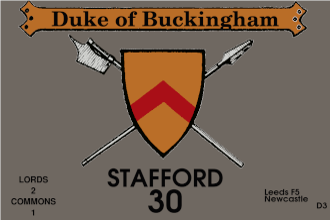
Humphrey Stafford, 6th Earl of Stafford, 1st Duke of Buckingham
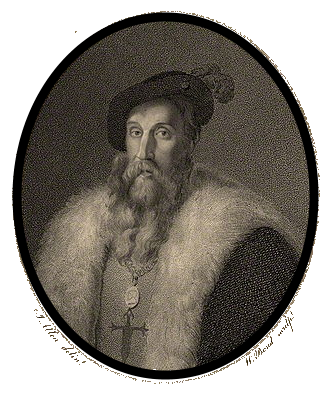
The Barons of Stafford were created when a minor nobleman, Edmund de Stafford was summoned to Parliament by writ of King Edward I in 1299 and named the Baron de Stafford. Thus, the Staffords don’t quite have the same pedigree as say the Beauforts or the Percys. Edmund’s son, Ralph, was a soldier of note in the early part of the Hundred Years’ War. He accompanied King Edward III in the Gascon campaign of 1345 including the battles of Bergerac and Auberoche, and most famously at the English victory at the Battle of Crecy in 1346. He became one of the twenty-six founding members and the fifth knight of the Order of the Garter in 1348.
Ralph was created the First Earl of Stafford by Edward III in his jubilee year of 1350. Ralph’s son Hugh inherited the title, but as he died childless of illness on a pilgrimage to Jerusalem, the title passed successively to two brothers; one who died childless of plague in 1392 and the other who died childless of natural causes in 1395. The title then passed to Edmund Stafford, 5th Earl of Stafford, who died 8 years later at the Battle of Shrewsbury, fighting loyally for King Henry IV against Hotspur and the Percy Rebels. Our Humphrey, Sixth Earl of Stafford, was only one year old.
Stafford received a reduced inheritance, as his mother possessed separate dowries from a previous marriage. As well, by law, due to these financial complications, she could not be his guardian, so Henry IV’s wife, Queen Joan of Navarre did. Stafford assumed the profession of arms as a minor, as there was still fortune to be had in France and his reduced income could not support his estates. He campaigned with King Henry V and was present at his death on 1422. Stafford became a member of Henry VI’s Regency council when Henry succeeded the throne as an infant. This began a long period of loyal service to the Crown, for which he was rewarded in 1444 as the First Duke of Buckingham. Also this began a long , sometimes rivalry-fueled acquaintance with the Beauforts; jockeying for position and influence with first his Uncle, Henry Beaufort, Bishop of Winchester and Head of the Regency Council, and later in France with the Duke of Somerset, his cousin.
Stafford (from here referred to as Buckingham) largely managed to stay out of the enmity growing between the Houses of York and Lancaster and tried to serve as a peacemaker between the two. He backed Somerset’s government before the King’s Incapacity and but attempted to negotiate with Richard of York and prevent the situation from coming to blows during the time of Cades’ Rebellion.
Buckingham backed Richard’s Protectorate during the King’s Incapacity and took part in the council meeting which resulted in the arrest and subsequent year-long imprisonment of the Duke of Somerset. After the King’s recovery on Christmas Day, 1454, Somerset was released—or may have escaped—from the Tower. Some commented how Buckingham “straungely conveied” Somerset from prison, but it is uncertain whether this was as a result of the King ordering his release or whether Somerset escaped with Buckingham’s connivance. Is Buckingham a peacemaker? Is he backing the side that seems to have the advantage when the moment suits? Will he choose a side?
Faction Leader Profile
@Kolbex The Earl of Wiltshire’s Faction (Moon)
Robert de Holland, 6th Baron de Holland, 2nd Earl of Wiltshire, Captain of Calais.
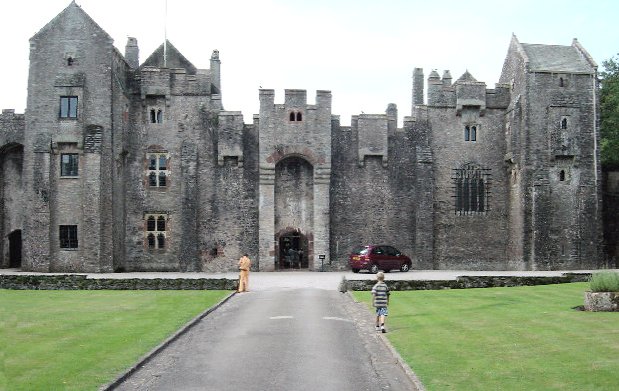
Compton Castle in the parish of Marldon
Robert de Holland, 1st Baron Holland was born around 1283, who became a favorite knight of Thomas, 2nd Earl of Lancaster. After fighting for Thomas in the Banastre Rebellion, a civil war started by rival barons, he acquired large plots of land, because of his role in the war. The Holland legacy and fortune grew under the 2nd Baron, Thomas Holland. In his military career he was engaged, from 1340-1346, in the Army engaged in the Hundred Years’ War. In 1346, he attended King Edward III into Normandy and at the Battle of Crécy, he was one of the principal commanders in the vanguard under the Prince of Wales. In 1348, he was invested as one of the founders and 13th Knight of the new Order of the Garter.
Fortune smiled on the 3rd Baron, Thomas Holland as his widowed mother, Joan the Fair Maid of Kent, married Edward III’s Heir Apparent, the Black Prince, Edward of Woodstock, and bore him a son, Richard, who succeeded Edward III as King Richard II. Holland acquired great influence over his younger half-brother, which he used for his own enrichment. In 1381, he succeeded as the 2nd Earl of Kent, securing the title from his Mother’s inheritance.
He was succeeded by his son, Thomas, 4th Baron of Holland and 3rd Earl of Kent, a staunch supporter of King Richard II. King Richard II sent Kent to arrest his own uncle, the Earl of Arundel. In reward he received a share of the forfeited estates, and on 29 September 1397 was created Duke of Surrey. Surrey, along with many of King Richard II’s advisors, was arrested after the King’s deposition by King Henry IV in 1399. In the end he had to forfeit the honors and estates he had gained after the arrests of Gloucester and Arundel, in particular the Dukedom of Surrey, although he retained the Earldom of Kent. Early in 1400, Kent, along with his uncle, the Earl of Huntingdon plotted to kill King Henry IV and free King Richard II from prison and return him to the throne. This “Epiphany Rising” failed and Kent was captured and executed. He was succeeded as 5th Baron of Holland by his brother Edmund, as the Earldom was now forfeit to the crown.
Edmund Holland, in an attempt to revive the family fortunes, went to France as a Soldier in the English Army, distinguishing himself as a senior lieutenant and supporter of Richard of York in whose service he was followed into France by his 14 year old son and Heir, Robert De Holland in 1540. In 1442, in recognition for his service, Edmund Holland was awarded the Earldom of Wiltshire largely due to the then-influential lobbying of Richard of York and died in 1449.
Robert, 6th Baron of Holland and 2nd Earl of Wiltshire has recently returned from Calais and has been largely uninvolved in the political turmoil that has swept the country, and his father’s death before the escalation of tensions began in earnest in 1550. Will he repay the family debt to the House of York in raising it back from obscurity and near oblivion?
Faction Leader Profile
@Cuthbert The Earl of Kent’s Faction (Sun)
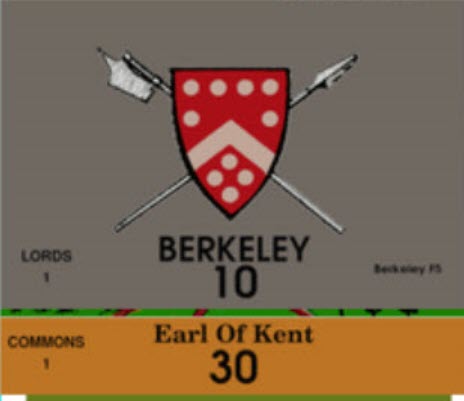
James Berkeley, 1st Baron de Berkeley, 1st Earl of Kent
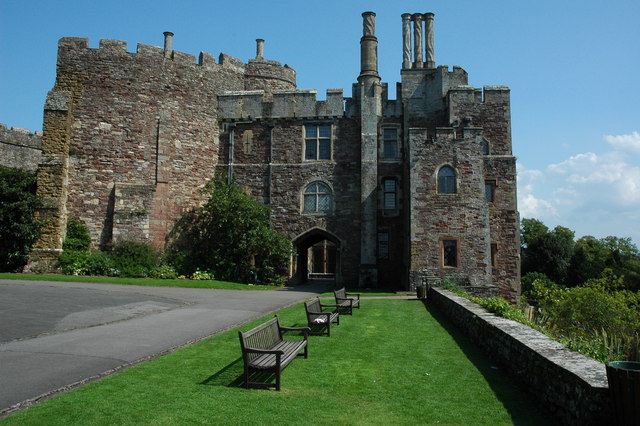
Shell keep and inner gatehouse of Berkeley Castle, viewed from the outer bailey.
James de Berkeley was the son of Sir James de Berkeley and his wife Elizabeth (née Bluet). He was made heir to his uncle Thomas de Berkeley, 5th Baron Berkeley, when his line became extinct. James de Berkeley was involved in a bitter feud with his cousin Elizabeth, daughter of the fifth Baron Berkeley and wife of Richard de Beauchamp, 13th Earl of Warwick. He was unable initially to claim Berkeley Castle, as it was taken in possession by the Earl and Countess of Warwick. In 1421, when the Warwicks finally gave up Berkeley Castle, James was summoned to Parliament by writ as Baron Berkeley, granting him the title. The feud did not end there as later in life, his wife Isabel de Mowbray (Aunt to the 3rd Duke of Norfolk, John Mowbray), was captured by the Countess of Warwick’s son-in-law the Earl of Shrewsbury and held imprisoned until her death in 1452.
The writ which granted Berkeley his estate was issued by the court when it was dominated by the Duke of Somerset, for which Berkeley is grateful. As well, the Neville Family, aligned with the Yorkists, inherited the Warwick’s claims to Berkeley seemingly pushing Berkeley deeper into the Lancastrian camp.
However, with the title of Earl of Kent (sixth creation) in abeyance since the death of Edmund Holland, 4th Earl of Kent without issue, the Protectorship of Richard of York, with significant lobbying from the 3rd Duke of Norfolk, John Mowbray, awarded that title to Berkeley making him the 1st Earl of Kent (Seventh Creation) in 1453. This also sowed division between he and the Holland Family, who still see that title as their right.
Upon the King’s recovery on Christmas Day, 1455, the 1st Earl of Kent finds himself indebted to both the Houses of York and Lancaster. And with enemies who may align with either. Which way will he turn to continue to defend his rights and property? Will he align with family relations? Will he align against enemies? Must he choose a side?
Faction Leader Profiles have been completed. Diplomacy may commence now. The First Round, 1455, will commence when we decide to begin.
Play order each round starts with player who controls the Noble assigned the office of Chancellor of England. If no Noble holds this office then play starts with the play who holds the Noble assigned the senior bishop in this order: Canterbury, York, Durham, Carlisle, Lincoln, Norwich; Otherwise play begins with the player who has the most troops.
@Ironsight controls the Archbishop of Canterbury. Then we go “clockwise around the table”. So the order of play for this round is:
1.) @Ironsight 2.) @David2 3.) @Kolbex 4.) @Cuthbert 5.) @CraigM 6.) @Panzeh 7.) @CF_Kane
We are ready to begin immediately. There is no need for a Diplomacy grace period before start. Players may PM (please try to cc me) or may engage in tête-à-tête publicly.
To all the players, would you prefer to start now or soon? As well, what kind of Christmas Break (if any) do you need? Everyone, please respond to this query.
Many Thanks,
The Moderator
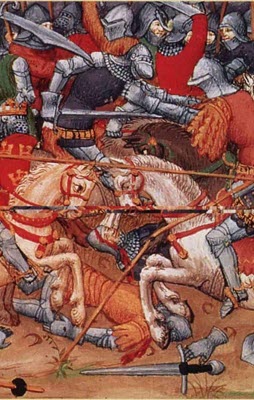
Now is fine with me, I’m not travelling for Christmas or anything.
I have been, and have Christmas parties the next two days. Flying cross country with three kids and all.
But I’ll get up to speed this evening, once Christmas party #2 is over.
I will be offline the Thursday and Saturday after Christmas. Other than that I should be available.
If we start sooner, your absences shouldn’t matter, as you go firstest.
I was just thinking that if people are already busy for the holiday then any planning before I move will be difficult.
We don’t stop for Diplomacy/Coordinations in this PBF per the PBF rules. 😀
Sometimes, you just gotta move a pawn.
I can play whenever.
@panzeh informs me he is good to go too, via alternate messenger. So we just need @Kolbex and @David2 to chime in.
Regarding Christmas Eve and the Day itself, if people wanna play, that is fine, but the Holy Mother Church gives absolution of the Sweating Sickness Corollary on those days, and if it comes to it, Ironsight’s preplanned absences and any other days people throw out here for the Christmas Week. The Moderator will be available all through the holidays, however.

